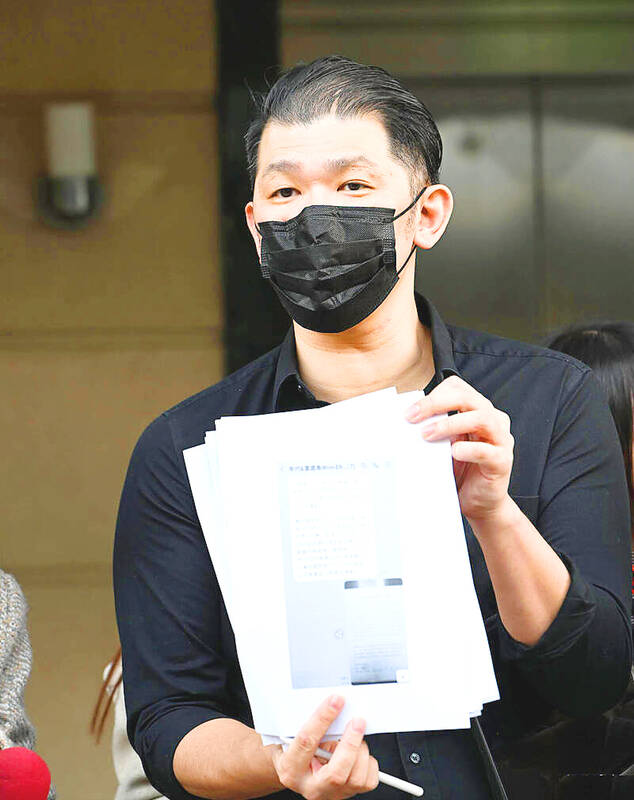About 150 travelers to Vietnam’s Phu Quoc Island caught in a dispute between travel agencies returned to Taiwan yesterday, while the remaining 600 are scheduled to return today.
Mega International Travel Service (美加國際旅行社), which operates the brand We Love Tour (年代旅遊), chartered four planes on Friday and Saturday last week to transport about 750 travelers to the island for five-day tours.
The travelers were then entrusted to Vietnamese tour companies for local tours, 292 of whom were entrusted to Vietnam WInnER International Travel Co.

Photo: Rachel Lin, Taipei Times
However, WInnER on Saturday asked the tourists to pay US$720 each to continue, saying that Mega had only paid one-10th of the tour fees before the group left Taiwan.
On Monday, the Tourism Administration said that more than 100 of the tourists had paid the extra amount.
However, Mega had also not paid for chartered flights it booked with Vietnam’s Bamboo Airways, it said, raising concerns that the tourists could become stranded on the island.
Yesterday, the agency said that Mega had reached an agreement with the Vietnamese companies and airline to complete the tours and return the travelers on chartered flights as scheduled.
All 750 travelers received their flight tickets home, 150 of whom flew back at noon yesterday, Mega general manager David Lin (林大鈞) said.
The remaining 600 are to fly back today on three separate flights, including all 292 in the disputed tour, he said.
The Tourism Administration also reiterated that it was working with the Travel Quality Assurance Association (TQAA) to investigate whether Mega had contravened the Regulations Governing Travel Agencies (旅行業管理規則) and its client contracts.
The case would be handled in three ways: The tourism agency would conduct an investigation, the TQAA would assist with consumer disputes and clients may file lawsuits against Mega, it said.
Later on Monday, Mega in a statement rejected WInnER’s claims, saying that the groups in question were the first cooperation between the Taiwanese firm and WInnER.
Mega said the two companies previously came to an agreement, observed by a witness, that all payments would be cleared by Feb. 26.
WInnER went back on the agreement and asked for the complete payment after a tourist complained about a meal on arriving in Vietnam, the company said.
It also implored tourists to “refrain from being held hostage financially” by the Vietnamese company, and promised to cover all losses sustained by its clients.
WInnER later that evening accused Mega of attempting to “lead the narrative.”
Although Mega said it would settle its accounts on Feb. 26, the two sides have no contract agreeing to that date, the Vietnamese company said, adding that their contract stipulates Jan. 31 as the payment deadline.
However, after being contacted by Tourism Administration officials in Ho Chi Minh City to facilitate negotiations and ensure the safe return of the tourists, and fielding many distress calls from tourists with nowhere to stay, the company decided to help despite the delayed payment, WInnER added.
Bamboo Airways yesterday said it also decided to help the travelers return out of humanitarian considerations, even though Mega had not paid for the return flights.

The CIA has a message for Chinese government officials worried about their place in Chinese President Xi Jinping’s (習近平) government: Come work with us. The agency released two Mandarin-language videos on social media on Thursday inviting disgruntled officials to contact the CIA. The recruitment videos posted on YouTube and X racked up more than 5 million views combined in their first day. The outreach comes as CIA Director John Ratcliffe has vowed to boost the agency’s use of intelligence from human sources and its focus on China, which has recently targeted US officials with its own espionage operations. The videos are “aimed at

STEADFAST FRIEND: The bills encourage increased Taiwan-US engagement and address China’s distortion of UN Resolution 2758 to isolate Taiwan internationally The Presidential Office yesterday thanked the US House of Representatives for unanimously passing two Taiwan-related bills highlighting its solid support for Taiwan’s democracy and global participation, and for deepening bilateral relations. One of the bills, the Taiwan Assurance Implementation Act, requires the US Department of State to periodically review its guidelines for engagement with Taiwan, and report to the US Congress on the guidelines and plans to lift self-imposed limitations on US-Taiwan engagement. The other bill is the Taiwan International Solidarity Act, which clarifies that UN Resolution 2758 does not address the issue of the representation of Taiwan or its people in

US Indo-Pacific Commander Admiral Samuel Paparo on Friday expressed concern over the rate at which China is diversifying its military exercises, the Financial Times (FT) reported on Saturday. “The rates of change on the depth and breadth of their exercises is the one non-linear effect that I’ve seen in the last year that wakes me up at night or keeps me up at night,” Paparo was quoted by FT as saying while attending the annual Sedona Forum at the McCain Institute in Arizona. Paparo also expressed concern over the speed with which China was expanding its military. While the US

SHIFT: Taiwan’s better-than-expected first-quarter GDP and signs of weakness in the US have driven global capital back to emerging markets, the central bank head said The central bank yesterday blamed market speculation for the steep rise in the local currency, and urged exporters and financial institutions to stay calm and stop panic sell-offs to avoid hurting their own profitability. The nation’s top monetary policymaker said that it would step in, if necessary, to maintain order and stability in the foreign exchange market. The remarks came as the NT dollar yesterday closed up NT$0.919 to NT$30.145 against the US dollar in Taipei trading, after rising as high as NT$29.59 in intraday trading. The local currency has surged 5.85 percent against the greenback over the past two sessions, central